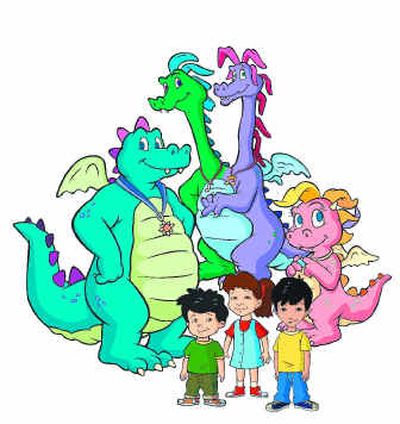Dragons & diversity

NEW YORK — Max and Emmy have a new neighbor, and with the addition of Enrique to the cast of “Dragon Tales” comes a renewed focus on the Hispanic roots of the PBS animated series. Enrique is 6 and he’s bilingual. He’s being raised by his father and grandmother, and was born in Colombia and spent time in Puerto Rico before moving next door to Max and Emmy — and their house with a magical playroom.
When Max and Emmy first invite Enrique to Dragonland, he’s skeptical and then a little scared. This gives the show an opportunity to explore young children’s feelings when they are exposed to something new, explains Rita Weisskoff, the show’s co-producer and content director.
But once he’s ready to meet the other characters and visit their world, he’ll see things that Emmy and Max, and probably most viewers, never noticed.
Enrique gives “Dragon Tales” a chance to expand its surroundings and story lines – and Hispanic content – in its third season, Weisskoff says.
“We had always wanted to reach out more than we were to the Hispanic community,” she says. “Max and Emmy do come from a background in Mexico and do refer to their `abuelita’ and a few words, but when we decided to add a new character, we looked at having a child move next door who could put more of an emphasis on the Hispanic culture in a natural way. … He can naturally integrate the Spanish language in the way that he speaks and he can remember experiences and share them with the other kids.”
Adding these bilingual elements, which also will be seen in wise dragon Quetzal’s increased role, is intended to broaden “Dragon Tales”’ reach, not limit it.
“We’re trying to show how across cultures, kids play the same games and have the same questions and feelings. They just might have different words,” Weisskoff, a language arts and reading consultant and a a former teacher, says. Exposure to customs from other cultures is beneficial to both Hispanic and non-Hispanic youngsters, she adds.
When one of Cassie’s 72 siblings leaves home for cooking school, Enrique comforts her by singing a Spanish goodbye song, and when Ord is trying to learn his numbers in Spanish, Enrique suggests playing “rayuela,” a Latin American version of hopscotch.
Friendships are the heart and soul of the show, according to Weisskoff, and it’s what children really respond to.
The show conducted a survey of mothers who were sent previews of the third season’s shows; 100 mothers were English-only speakers and 84 were English-speaking Hispanics. After they and their kids watched five episodes, the mothers were contacted by phone and asked their impressions.
Weisskoff reports that both groups of mothers enjoyed the show, and they all cited the positive messages and the little life lessons, especially those that focused on coping skills. More of the bilingual mothers also noted the Hispanic content, which is sort of “Dragon Tales” goal: a recognition of the growing Hispanic population in the United States but an emphasis on all children.
The same “mainstreaming” message applies to Lorca, a dragon in a wheelchair, who’ll be seen on screen more often.
Neither the dialogue nor the other characters make it a point to highlight Lorca’s disability; it’s simply part of the show and is incorporated into episodes just like the other challenges any of the characters might face.
“Our goal is to acknowledge (children’s) feelings, and give them strategies to cope and move ahead,” Weisskoff says.
She adds: “We’re really interested in having kids learn something and we’re not a letters and numbers show, so for us it is about the life lessons.”